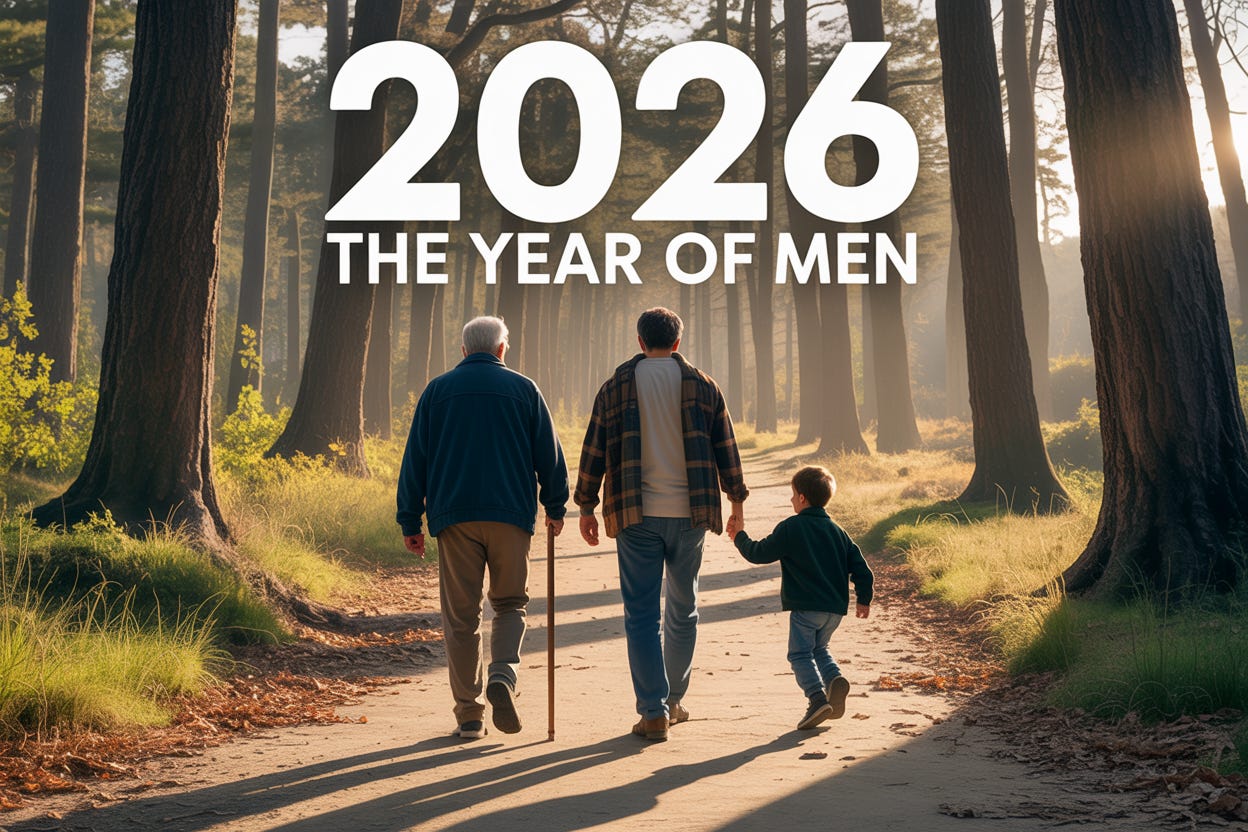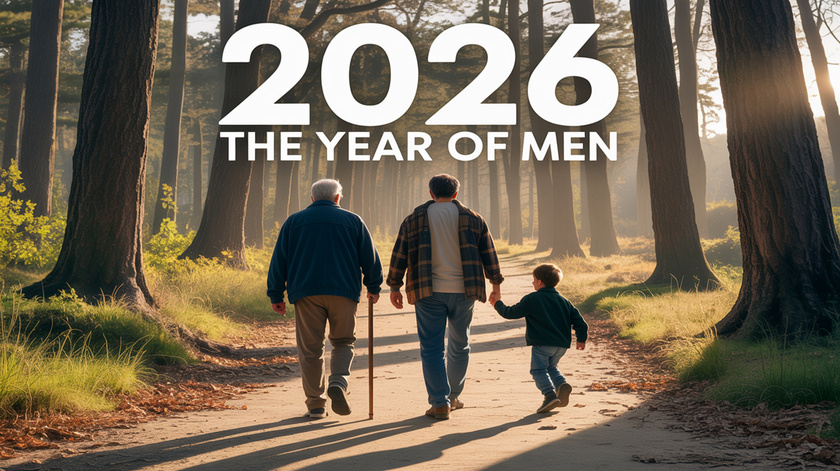This post is dedicated to my friend Mark Sherman, PhD., his sons, and his grandsons. Mark and I share a quiet hope — that we will live to see meaningful progress in the status of boys and men.

Every movement begins as an act of imagination. Before anything changes, someone has to picture what fairness would look like if we truly meant it. I wrote this piece to imagine that world — one where men are finally seen in full, with all their depth, strength, and vulnerability. Maybe we’re not there yet. But maybe 2026 could be the year we start to be.
2026 The Year of Men
Imagine that. 2026 becomes the year of men — a year when the conversation shifts from accusation to understanding. For the first time in half a century, men are discussed not as a problem to fix but as people to know. Their genius, their quirks, their flaws, and their quiet strengths are spoken of with the same nuance once reserved for others. College campuses devote programs to exploring men’s lives — their needs, their distinct ways of solving problems, their inner drives. Professors begin to ask questions that once felt off-limits: How have we misunderstood men? What happens when we stop pathologizing masculine traits and start appreciating them for what they are?
The change begins almost accidentally. A viral documentary follows several men through their daily lives — a father fighting for custody, a veteran mentoring fatherless boys, a young man navigating college under a cloud of suspicion.The film ignites something. People start talking about the thick wall of stereotype threat that has been built around men for the last fifty years, and how it quietly shapes everything — from the classroom to the courtroom. The wall doesn’t fall overnight, but it begins to crack.
Soon, the media joins in. Morning shows run thoughtful discussions about men’s emotional lives — how men experience feelings deeply but process them through action, purpose, and silence. Reporters highlight research showing that men’s stoicism, logic, and devotion to service are not deficiencies in empathy but expressions of it. Family court reforms begin to take shape; male victims of domestic violence are no longer turned away simply because they are male. It feels like a cultural exhale — the long-suppressed conversation finally given air.
At first, people are disoriented. After decades of being told that men’s pain doesn’t count, even fairness feels radical. But something shifts. Women, too, begin to see their fathers, husbands, sons, and brothers with fresh eyes. The conversation isn’t about blame anymore — it’s about balance. A new curiosity replaces old resentment. The year of men doesn’t erase anyone; it invites everyone to understand half of humanity that’s been caricatured for too long.
Could it happen? Could a culture so comfortable blaming men ever turn toward truly seeing them? Maybe not all at once. But every change in history begins the same way — with the simple act of imagining it.
What Changes During the Year of Men
The first signs of change come from the ground up. Teachers start noticing boys again — not as potential problems to manage, but as minds to cultivate. Schools experiment with programs that fit how boys learn best: movement, competition, hands-on projects, and purpose. Reading lists begin to include stories of male courage and vulnerability that go beyond superheroes or villains. Teachers are trained to see how boys’ energy isn’t disobedience — it’s engagement looking for direction. For the first time in decades, boys begin to feel that classrooms were made with them in mind.
On college campuses, the tone shifts from suspicion to curiosity. “Men’s Studies” — long a taboo phrase — finds a foothold. Seminars explore how fatherlessness, male shame, and status pressure shape young men’s mental health. Professors dare to say what was once unspeakable: that men have suffered, too. A handful of women’s studies professors even cross over, lending their voices to help create a balanced understanding of gender that includes both sides of the human story. The conversations are messy but alive — and that’s the point. Truth is finally allowed to be complicated again.
The media, too, begins to rediscover men. Documentaries appear about the quiet heroism of everyday fathers, about men mentoring boys in forgotten neighborhoods, about the millions of men who keep the world turning through labor, repair, and service. Morning talk shows, once filled with segments ridiculing male behavior, start inviting men to speak for themselves. The tone softens. People listen. A viral story circulates about a construction crew that raised money to send a coworker’s son to college after his dad’s death. “This,” one host says on air, “is masculinity too.”
Relationships begin to heal in small but powerful ways. Wives notice that when their husbands go quiet, it’s not distance but effort — a man trying to manage his emotions in the only way that feels safe. Sons start asking their fathers for advice again, and fathers rediscover how much they have to give. In counseling offices, therapists begin learning what clinicians have long said — that men process emotions through action, that their silence isn’t absence but presence in another form. Couples therapy starts to meet men halfway instead of treating them as defective women.
And then there’s mental health. The great unspoken epidemic of male despair finally becomes speakable. Instead of shaming men for not seeking help, society asks why the help offered has so little to do with how men heal. Clinics start experimenting with men’s groups centered around work, movement, humor, and camaraderie — not confession circles that make them feel judged. Suicide prevention campaigns stop using guilt and start using respect. The message shifts from “talk more” to “we see you.” And something remarkable happens: men begin to respond.
The Resistance
Of course, not everyone welcomes the Year of Men.
The early months bring a predictable storm. Certain media outlets call it a backlash. Activist groups issue statements warning that focusing on men will “set back progress.” Think pieces appear overnight insisting that “men already have enough,” as if empathy were a limited resource that must be rationed. A few universities cancel events after protests claim that discussing men’s needs “centers privilege.” But this time, something is different: the public doesn’t buy it. Ordinary people — men and women alike — begin asking simple, disarming questions: How is fairness a threat? How can caring for men possibly hurt women?
The resistance grows louder before it grows weaker. It feeds on fear — fear that empathy for men might expose hypocrisy, that the old narratives might not survive open scrutiny. For decades, the culture has run on a quiet formula: men are the problem, women the solution. Challenging that myth threatens a moral economy that has funded entire industries — from grievance studies to gender bureaucracies to the political machinery that profits from division. When men begin to speak, those who built careers speaking about men feel the ground shift beneath them.
In talk shows and social media debates, the same tired accusations resurface: that compassion for men means indifference to women, that noticing male pain is a form of denial. Yet the tone of the conversation has changed. This time, people have seen too much. They’ve seen fathers emotional pain outside family courts. They’ve seen male victims of abuse turned away from shelters. They’ve watched boys fall behind in schools that call them “toxic” for being active, assertive, or proud. The moral logic of exclusion begins to collapse under its own weight.
And then something unexpected happens: some of the loudest critics begin to soften. A few prominent feminists admit that they never intended for fairness to become a zero-sum game. Others, quietly at first, confess that they are mothers of sons — and they now see what men have endured through their children’s eyes. The resistance doesn’t disappear, but it loses its moral certainty. It becomes clear that opposing compassion for men requires something unnatural: denying reality itself.
The Year of Men doesn’t crush opposition; it transforms it. It doesn’t argue so much as invite. It reminds people that love of men isn’t hatred of women — it’s love of humanity. The movement doesn’t demand anyone’s permission to exist. It simply tells the truth with calm persistence until the shouting fades and listening begins again.
The Renewal
By the end of the Year of Men, something subtle yet profound has changed. The culture feels calmer, more honest, more whole. The anger that once filled every gender conversation has lost its fuel. People have begun to see men not as adversaries or caricatures but as essential parts of the human story — the builders, protectors, thinkers, and dreamers whose lives are as sacred as anyone’s.
The public learns what therapists have known for decades: that men’s silence is often love in disguise. That the man fixing the leaky faucet before anyone wakes is saying thank you in his own language. That the husband who works overtime, the son who restrains his tears at a funeral, the firefighter who risks his life for strangers — all are expressing something profoundly emotional, though the culture has lacked the ears to hear it.
In this new climate, men begin to relax their shoulders. They laugh more easily, reconnect with friends, and find meaning again in work, fatherhood, and service. Fathers feel free to be the masculine dad that they are, and boys no longer learn that masculinity is something to apologize for.
The walls that once separated men and women begin to crumble, replaced by curiosity, gratitude, and humor — the natural bonds of people who have finally stopped competing for moral high ground and started building a shared one.
Women, too, find a surprising sense of relief. Freed from the burden of constant grievance, they rediscover what they always loved about men — their steadiness, their generosity, their willingness to stand in harm’s way. The battle of the sexes gives way to partnership. In homes and classrooms and workplaces, people start asking a forgotten question: What are men for? And the answers are not defensive anymore. They are joyous.
By the time December arrives, commentators summarize 2026 as “the year empathy grew up.” It’s not the end of the story, only the beginning — the moment when society realized that healing half of humanity heals the whole. The Year of Men becomes not just a cultural milestone but a mirror, reminding us that progress isn’t about trading one group’s dignity for another’s. It’s about finally understanding that men are good — and always have been.
Men Are Good.


















